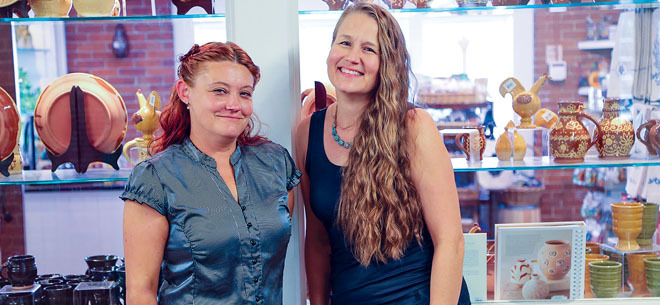Crafting History

“It’s a celebration of a continued, shared heritage,” explains Norah Messier (above left) of Plimoth Plantation’s second annual #i{craft}history celebration. #i{craft}history is an innovative weekend-long event dedicated to craft and community. “People perceive history as being over,” Messier, Director of Living Collections, Crafts, Trades and Domestic Skills, shared. “History is a part of us. Someone who knits today is a part of the heritage of that craft.”
Messier along with Vicki Oman, Director of Museum Programs and School Services, are two of the driving forces behind the September 26 and 27 event. Both women have worked in every aspect of the museum and their passion is electric. “What we’re doing is recreating the past,” Oman said. “Our goal is to make history accessible.” And fun.
Re-creating history is part of Plimoth Plantation’s daily mission. Artisans and archeologists from all over the country use actual artifacts, written accounts, renderings and archaeological recordings to build houses, farm, bake, re-create textiles and make items ranging from pottery to porcupine hair headdresses. “We try to synthesize as much information as possible to be as accurate as we can,” Oman said.
In addition to featuring Plimoth Plantation’s staff artisans, #i{craft}history features European, English and Native American guest handcrafters across a wide array of disciplines, from beekeeping to weaving, to demonstrate and teach diverse skills. Visitors can enjoy hands-on activities (appropriate for all ages), entertainment, a book signing and a Sunday farmer’s marketplace. New to this year’s event is an artisan market located in the museum’s Henry Hornblower II Visitor Center courtyard, where guests may purchase items crafted by featured artisans.
“We’ll also be celebrating a first birthday,” Messier added. “Plimoth Bread Company has completed its first year.” Instead of cake, master artisan baker Tani Mauriello demonstrates the wood-fired techniques of making 17th-century-inspired thirded bread—which is naturally low in gluten and delicious! To learn more visit icrafthistory.org.
Photo: David Costa


